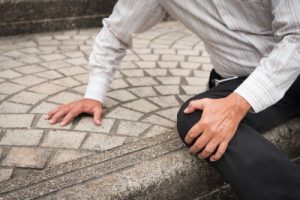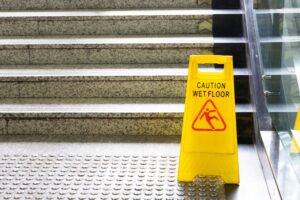Learn How To Claim For An Accident In A Public Place
By Stephen Moreau. Last Updated 29th May 2024. When you go out to a public place you have a right to be able to go about your business there without fear of being injured by safety hazards that could have been addressed by the owners and the operators of that premises. If controllers of premises have failed to meet a reasonable standard of safe operation and maintenance members of the public could be injured. If you have been hurt in an accident while in a public place that was not your fault, you could be entitled to make a compensation claim.

This page is a guide intended to introduce you to how making these types of claims work. It will cover what the obligations of operators of public spaces are and how and when they can be violated by a public space operators negligence. As well as explaining the law around when and how you could be able to make a compensation claim for an accident in a public place, this article will show how compensation claims are calculated.
Get In Touch With Our Team
If you would like to know more information about anything you have read here about making compensation claims for accidents in public places call our advisors. Or if you would like to have your case assessed for free then get in touch about your claim online. Alternatively, you can reach our team directly by calling 020 3870 4868.
Services And Information
- Who Can Claim For An Accident In A Public Place?
- How Could An Accident In A Public Place Happen?
- Accident In A Public Place Compensation Calculator
- How Much Time Do I Have To Claim For An Accident In A Public Place?
- Public Place Accident Claims On A No Win No Fee Basis
- Other Information
Who Can Claim For An Accident In A Public Place?
When you’ve been injured in a public place due to someone else’s negligent actions, it’s understandable that you may be looking for compensation. But it’s important to know when you have the basis of a valid claim.
Being injured in a public place alone may not be enough. In order to make any kind of personal injury claim, you need to be able to prove that negligence occurred. For the purposes of personal injury law, negligence is when:
- Someone else owes you a duty of care.
- They breach this duty.
- As a result, you are injured.
Under the Occupier’s Liability Act (OLA), the person or party in control of a public space owes visitors a duty of care. To fulfil this, they need to make sure that visitors are reasonably safe while there.
So, a slip and fall wouldn’t be enough to make a claim; you’d also need to prove that the slip was caused by a breached duty of care and that this caused you to become injured. To find out if you could be eligible to make a claim, contact our team today.
How Could An Accident In A Public Place Happen?
The steps that occupiers are expected to take to keep you safe in public can vary depending on where you are and what you’re doing. However, if they fail to take the necessary steps, this could result in an accident, for example:
- If a paving defect is reported to the council, they are expected to fix it in a timely manner. If they don’t fix it, and you trip and fall over the loose paving stone, this could cause serious sprain injuries and bone fractures.
- If a spillage is reported to a supermarket employee but is not signposted or cleared up in an adequate timeframe, a customer could slip and hit their head on the floor, causing a skull fracture and a brain injury.
- If someone reported a piece of faulty equipment at a gym but they continued to let customers use it despite it being unsafe, this could cause serious injuries. For example, a snapped weight cable could cause bruises and lacerations, as well as eye injuries.
If you’d like to find out if you could claim compensation for an accident in a public place, get in touch with our team of advisors today. They can evaluate your claim, and could potentially connect you to a solicitor.
Accident In A Public Place Compensation Calculator
When you make a public place accident claim, each case is unique and therefore the payout is tailored to the individual circumstances.
Every successful claimant receives general damages, which apply to all personal injury claims. General damages cover the pain and suffering you’ve experienced because of your injuries, and it also covers any loss of amenity.
Those who value your claim for general damages may use the Judicial College Guidelines (JCG) for help. This is a document that offers guideline compensation amounts for different types of injuries. In the table below, you can see some examples of these; please note that the first entry is not from the JCG.
| Injury | Compensation | Notes |
|---|---|---|
| Multiple Serious Injuries And Special Damages | Up to £1,000,000+ | Multiple serious injuries alongside financial losses, like lost earnings and travel costs. |
| Moderately Severe Brain Damage (b) | £267,340 to £344,150 | There is a substantial dependence on others as the claimant will be very seriously disabled. |
| Kidney Injuries (a) | £206,730 to £256,780 | Loss of both kidneys, or serious and permanent damage to both kidneys. |
| Severe Neck Injuries (a) (i) | In the region of £181,020 | Permanent spastic quadriparesis or incomplete paraplegia causing limited movement and headaches. |
| Severe Pelvis Injuries (a) (i) | £95,680 to £159,770 | Extensive pelvis fractures causing dislocation of the lower back joint and bladder damage. |
| Severe Back Injuries (a) (iii) | £47,320 to £85,100 | Chronic conditions caused by disc lesions, disc fractures, or severe soft tissue injuries. |
| Moderate Leg Injuries (iv) | £33,880 to £47,840 | Multiple fractures or very complicated fractures all on the same limb. |
| Less Serious Leg Injuries (c) (i) | £21,920 to £33,880 | Serious soft tissue injuries and fractures that do not completely recover. |
| Moderate Shoulder Injuries (c) | £9,630 to £15,580 | Frozen shoulder causing a limitation in movement. |
| Fractured Clavicle (e) | £6,280 to £14,940 | The award will depend on how serious the fracture and symptoms are. |
If you have valid grounds to claim general damages through a public liability claim, then you may also be able to claim special damages as part of your compensation. Special damages cover the financial losses that you have experienced because of your injuries. Examples of what special damages may cover include:
- Loss of earnings if you’ve been required to take unpaid time off work.
- Travel costs for attending vital appointments.
- The cost of prescriptions and certain other treatments you’ve required as part of your recovery.
- The cost of mobility aids or home adjustments.
When claiming special damages, you should present evidence of these financial losses. This could include receipts, payslips, bank statements and invoices.
To learn more about claiming compensation for an accident in a public place, get in touch with our team today.
How Much Time Do I Have To Claim For An Accident In A Public Place?
In personal injury cases, there is a time limit that applies to how long you can wait before you begin the claim. Bringing claims forward as soon as you can, can prevent evidence deterioration or witnesses who can no longer provide reliable testimony. The time limit to making a claim is generally three years. Where the time limit actually begins can vary. It may be from the day the injury occurred. Or it could be from the date you are knowledgeable.
There are exceptions to the three-year time limit. In some cases, the three-year time limit could be waived if the victim was in some way incapable of bringing a claim forward themselves. For example, if they were suffering from mental health issues and had to be declared incompetent. Or if they were in the hospital for an extended period of time during the time limit and were incapable of beginning a claim.
Another exception to this rule are cases involving children. If the person who suffered the injuries was a child at the time and under the age of 18, then their parents or guardians have the right to bring a claim forward until they reach the age of 18. Once the victim turns eighteen, they have the right to attempt to start a claim until they turn 21, equivalent to the three-year time limit.

Public Place Accident Claims On A No Win No Fee Basis?
If you want to make a claim with the help of a solicitor but wish to avoid expensive legal fees, what could you do? You could use the services of a No Win No Fee solicitor. This is a type of agreement is where you and your lawyer will sign a contract. It will state that the only payment to which your solicitor could be entitled would be a portion of the compensation payout which you could be awarded if the claim is a success.
This portion is capped. Under this agreement, you would not be obligated to pay further solicitor fees on top of this. Nor would you be obligated to pay solicitor fees before starting the claim, or after the claim in the event that it failed.
All of the solicitors on our panel can handle personal injury claims on a No Win No Fee basis. If you would like to approach us to start a claim, please contact us using the contact details provided. We are happy to give you an advisor to speak to you about the details of your case. If you would like more information on how making a No Win No Fee claim could help you out, call our claims team today.
Other Information
We’ve included some links below on the topic of what to do if you have an accident in a public place and other related topics.
- Compensation claims for cycling accidents
- Personal Injury Compensation claims for accidents while at work
- Compensation claims for accidents while on holiday
- Information on the Health and Safety Act 1974
- Information on how to make a health and safety complaint to a local council
- You can request the CCTV footage for evidence if you appear in it
- Fatal Accident Compensation Claims
- How To Claim For A Fatal Accident
- How To Claim For An Accident On Public Transport
Thank you for reading our guide on what to do following an accident in a public place.




